Laptop Man & New Remote Realities | #280
Some thoughts, riffs, and reflections on remote work, austin, laptop man, and the future of work
+ I’m co-hosting a book event with in SF on November 7th: Join here if you are in town.
+ Good Work is now live on audiobook on Amazon, Audible, and iTunes. You can listen to a preview on my podcast too.
Remote work is now a normalized part of our modern working world.
Based on this chart from Kastle (a badging company) that I’ve been following for the past few years, occupancy rates plateaued between 40-60% depending on the city for at least 2+ years.1
This overall number, however, only tells us the average occupancy. It doesn’t tell us about the different percentages of companies employing which specific strategies.
But the company does break it down by day. From the daily averages, we see that Friday has become a de-facto stay-at-home day for almost 7 out of 10 people, and Tuesday is the de-facto in-office day for 6 out of 10 people.
Looking at each day, we find that the default pattern is a hybrid 3-day in-office work arrangement.
We also see there there hasn’t been much shift in this over the last year (despite continued press about “return to office” moves like as Amazon).
These numbers do tell us that there has been a broad acceptance of remote strategies but it doesn’t give us a lot of detail about the specific strategies of companies.
In terms of thinking about remote work, Gitlab has a good overview of the spectrum of options:
No remote
Remote tolerated
Remote exceptions
Remote allowed
Remote-hybrid
Remote days
Remote first
Remote only / All-remote
No in-person allowed
The interesting thing about all of this is that there are far more experiments underway about how to organize a company. It will be fascinating to see if this leads to any radically better ways of organizing teams. Time will tell.
I’ve been pretty curious about how all of these shifts are impacting day-to-day worker’s lives:
Luckily, the latest American Time Use Survey broke their data down by “people who work at home on an average day” and “people who work at an office on an average day.”
Of the 106 million full-time workers, we find that about one-third are “remote first” and two-thirds are office-first.
And these groups spend their time very differently. According to the survey, the 34.4 million Americans who are at home on an average day, work about 5.37 hours per day.
To me, the notable thing about this was that even if you add some prep time for work, this is much less than 50% of an average day.
When I was working full-time, I felt as if my every moment was organized around work — preparing, working, or decompressing from work.
At least for me, my shift to less work (but surprisingly, much more output) has given me some welcome space that has enabled me to work in a much more sustainable way.
Here’s my rough way of showing this shift, comparing the time spent in-office and commuting compared to this group of remote-first people working far less.
My first reaction to this was “Wow 5.4 hours of work? That feels low”
It will be interesting to see if they do a more in-depth analysis of this group in the coming years because I have questions:
Will this hurt labor productivity?
Undermine personal career ambitions and networks?
Nudge collective attitudes toward work?
And even, Is this number real and relevant? Is it just more dramatic because people are counting time differently?
And most of all, is this better? For who? And what are the second-order consequences of this?
For some people, having the majority of their day not oriented around formal work and commuting is a huge positive shift. You can count me in that camp and this clearly biases me in my default to seeing remote work as positive.
But over the past two years as I’ve talked to many people I’ve increasingly heard mixed reviews.
Over the past couple of weeks, I had a number of conversations with people in full-time jobs who are also working less than 8 hours per day.
Here are their reactions (all quotes are anonymous sources):
“The lack of ability to wind down” between work and non-work: multiple people said they struggled to separate their work from their non-work and found it easy to work whenever things came up, not on a standard schedule. One person said they “missed the commute” as it was a way to unwind before re-entering the home.
Two people mentioned “remote handcuffs” — As one friend said, “Why leave to pursue something else when I have it 'so good' right now? Will I ever find a job like this again? I asked myself those questions for almost two years.” She only left because she was laid off: “Upon getting laid off…I was shocked to find that I had SO much more energy each day. Turns out, even working just a few hours per day on something I'm not aligned with, still drains me quite a bit. I just couldn't see the energy suck until it was taken away.”
“It forces reflection” which can be good or bad depending on your path: One person mentioned that in the office, “there’s always something to do/talk about. There’s even just more time spent on the routine (commute, lunch, connecting with folks). It distracts you (from asking deeper questions.” But to him, not having this has been a “gift,” as it “gives me the time and space to ask myself if this is really how I want my work story to go.” If you are moving toward something like self-employment, this could be a good thing, or it could throw you into a spiral of indecision.
An increase in a sense of agency: “It feels like I can make a lot more of my own decisions based on my own needs, not on my company’s needs. I feel a lot more agentic.”
Not having “career ambition” “I felt like I was cheating at life even though I was meeting all my goals, and though my team was happy with me. It also made me complacent, why move up into management when I would go from working 20 hrs/week to working 60? My coworker (also remote, and with similar values as me) who did the same job as me became a manager, and 6 months later told me it was a mistake- he wanted his life back.”
A sense of time abundance and lack of rushing: “When I was in the office working full time, I loved my work but the dynamics of needing to leave early to beat traffic, running out to grab food, trying to focus with all the small talk distractions had me in a state of …. Rush? I always felt like I was out of time. WFH, especially part-time, makes tasks like warming up lunch, or squeezing in a drs appointment, meeting a contractor, much more seamless.” Another person mentioned a similar thing:
A need to proactively plan social engagement outside of work: Remote work often leaves people isolated, “At the end of the day I feel like I got a lot done, but I need to get out in the world. Whereas when I was in the office I couldn’t wait to get home because I was engagement-saturated.”
Harder to “go back”: this is an interesting one and aligns with many people who become self-employed. It’s often hard to motivate yourself when there aren’t physical people around to hold you accountable. As one person wrote, “The productivity consequences will be evident in the future if I return to a full-time office role.”
Even in the office, you are still alone: After I published this piece,
added some reflections on working in a hybrid office environment that I thought was worth sharing.I think one aspect that is often overlooked (especially by companies dictating RTO in a hybrid company culture) is that the ways companies have changed since the pandemic also made in-office jobs less enjoyable.
A lot of companies have teams spanning many locations so they can hire the best people from everywhere. You’re working in a loud, open layout office, don’t have your own desk and in some cases (as I experienced) you’re not even allowed to grab a desk for the day, you’re expected to clear your stuff for every meeting. All of this means: when you do come to the office, you’re spending the day alone, jumping between floating desks and virtual meetings, eating lunch by yourself in a room full of strangers.Sure, some people love meeting new people all the time but as an introvert, it has made me feel like I’m even less suitable to work a normal job because I need a stable team to feel comfortable.
I loved the energetic feeling I got in university from working intensely on a project with my class mates and for that, I would happily go to an office. But I’ve pretty much never had this happen at my jobs (I started working in the middle of the pandemic) so it feels completely pointless to go to an office.
If I had to summarize:
The positives: increasing time to one’s self, time to take care of life’s tasks, more reflection and less busyness, a potential test or pathway to future work transition to something more entrepreneurial
The negatives/challenges: need to proactively bootstrap social life, harder to trade time back for career upside, lack of career ambition, complacency, too much reflection, no clear demarcation between work and home.
I feel like this whole shift is under-theorized
In the 1950’s William Whyte wrote The Organization Man. He was noticing a lot of new things, all emerging at once:
Corporate loyalty to big companies
Suburbs cropping up to house those workers
Increasing class consciousness
Attachment to material success and convenience (especially through appliances and consumer products)
A broader “social ethic” of fitting in and playing the game
Today, we are seeing a similar shift in work.
But unless I write a book about this, I don’t think anyone is really capturing the new emergent reality around work.
Over the past 5+ years I’ve noticed many new norms that seem consistent among the new “laptop man”:
Health & experience-first lifestyle, secular monks optimizing the self
A blur of lines between online and offline friends, networks, and communities
An individualistic ethic - prioritizing the hero’s journey over a collective mission
A preference for urban environments or at least in the urban “donut,” which at least in the US means a very expensive kind of life
Extended young adulthood, sometimes in rejection of family, dating & kids
Increasing embrace of hobbies, side quests, and pets, especially dogs, that are easier to embrace with more time at home
A preference and desire for increasingly larger houses and home bases that can encompass work, life, and fitness
Increasing dual-income strategies leveraging remote work to build a family
Put more simply: If organization man attempts to belong to everything, laptop man does not belong anywhere, except neap a laptop.
In Austin, I’m surrounded by not only this remote-first full-time work crowd but also a broader class of people who are taking this further with remote-first self-employment and what I might half jokingly call “underemployment”
For me, this is great, because there are more people to hang out with on a random Tuesday when I’m biking around with my daughter and many people that are happy to join me to co-write or work at a third place.
But the entire time I’ve spent in Austin, I have felt as if something is off. There is a network of people passionately working on interesting things but when I step back a bit there isn’t a coherent story tying things together other than a broad FAFO / make bets on probabilistic outcomes energy. While there is widespread support with people rooting for each other, something I’ve appreciated after hibernating in Asia, it’s not clear there is a deeper connective tissue or commons that people are contributing to. It’s just likes for likes.
Of course, this isn’t new. We’ve been bowling alone since the 80s. But this hyper-individual thread when it comes to work does feel new. And I’m not quite sure what it all means. It’s not good, bad, or otherwise. I just notice it happening and believe this gigification of work will continue.
From a societal perspective, I don’t really have any strong takes. But at a personal level, I do think its really important that people think about how their work path interfaces with their community, friends, and broader culture. For people, especially those who enjoy spending time experimenting with and redesigning their lives, the upsides can be enormous. But for others, who just don’t want to do that, or like to have a standard workweek protocol to opt into, it can be a bit more lonely and uncertain than a traditional work path.
This is part of why I wrote The Pathless Path. I was not only trying to write myself a new story for my own life path, I was also trying to give others an open-source starting point for doing the same thing in their lives. Based on the reaction, it seems many people did want this. But a far larger group probably prefers to do what most other people are doing and don’t want to engage in this kind of personal world-building.
So this might be the takeaway: we are in a new work paradigm, time freedom and flexibility are for sale, at a better “price” than ever, but to realize the upsides of this freedom you will need to spend time developing your own narrative for how to navigate this new world and find the others exercising freedom in the same ways.
I think I’ve been lucky on my path. From the beginning, I was determined to make this path work. I have something I want to fight for. And that’s enough. When Angie joined me, it made me even more determined, as we now had families in two parts of the globe. And throughout this, I’ve had a kind of work, my “good work,” that has not only helped me make sense of my path, but has also enabled a lot of other aspects, like friendships, opportunities, and creative expression that are vital for me to be on a path that feels coherent to me. And now that I have some of these upsides, especially with a child, I’m more determined than ever to maintain them.
It’s been interesting to meet so many people in this underemployed scene in Austin: the YouTubers, podcasters, the indie hackers, health influencers, Instagrammers, the EA-funded researchers, the writers, TikTokers, and the post-exit founders reinventing as influencers and angel investors. While I admire a lot of these people for their work, I find that they are more focused on trying to be a creator/influencer/podcaster etc… than actually immersing themselves in any underlying work. In addition, many are younger and sort of see these paths as a their career.
I think this is a mistake because this kind of work is not really a career at all. It is ultimately an artistic path that probably maps better to artists throughout history. These are noth paths that can be planned and they rarely come with predictable and rising income.
There is one group of people I’ve been consistently impressed with, however. It’s the full-time workers FOR the creators that have found escape velocity beyond of this artistic reality. They are the people behind the people. They run the writing, the media, the editorial, or the video for big names you’ve heard of. I love these people. I can think of about a dozen of all these people and all seem to have their acts together.
I suspect what is going on is that they are able to adopt a traditional career story “I have a job” in a way that let’s them deepen into their work and focus on improvement.
Whereas if you are trying to be a “creator,” or more simply an artist, people are spending a lot of energy focused on trying to turn the path into something that maps to the stories about work they grow up with (a career, stable, provides growing income, etc…)
So if you are curious about exploring this whole new creator world, I think the best strategy is to try to find a job inside one of these teams. There are a lot of these gigs if you know where to look. If this world existed in 2015, that likely would have been my path. But I just had no idea what I was doing.
Bottom line: work is definitely changing. Almost everyone I talk to in any kind of work says that things feel weird. They don’t know the best strategy for a career anymore. They have mixed feelings about remote or in-person work. And that means its going to feel weird.
But like always, we will learn and adapt.
I’m excited to see how today’s young people reinvents work.
I’m sure I’ll have some complaints as we all do as we age.
But it will certainly be fun to follow along.
#2 Reads & Recommendations
Why to write a memoir
Tucker Max’s advice on writing a memoir is excellent. Angie and I have been studying his ideas on personal writing for years.
I also love his framing of writing a memoir and the options you have:
Publish it to the public
Print it but only share it with trusted friends
Complete it and don’t share it
I suspect this is a better way to start writing a personal narrative, especially a book. Too many people think about BOOK(TM) rather than dumping words on a page (At least at first).
This podcast with David was great
Also, Angie recommends the series from Scribe Book school
Chip War
This was a comprehensive deep dive into semiconductors' history post-WWII, up to the current “chip war” between China and the US. A few high-level takeaways
Semiconductors have been linked with national security from the beginning of the industry, including the Cold War with Russia, our semi-trade war with Japan in the 80s, and now with China
It is an incredibly sophisticated and complex industry but I was impressed to learn how dominant the US is across every aspect of the supply chain. I didn’t realize how much TSMC and ASML were dependent on US-based software and technology. This enabled a quite crippling attack on Huawei a few years back that China is still recovering from
While Moore’s law has described the innovation cycles in this industry for a long time (even though it has slowed a bit) I don’t think I appreciated how much the industry is constantly pushing the edges of possibility with every cycle — inventing new things and new solutions every time.
I did the audiobook which was quite a long listen but it has many mini stories which made it easy to digest.
Greenlights (The audiobook)
Before recording my audiobook I binge-listened to Greenlights by Matthew McConaughey. I haven’t listened to many audiobooks but if you like raw, personal memoirs, and authentic storytelling, you’ll likely love this audiobook (h/t Kevin for the recommendation).
His story is very “pathless,” which surprised me, not knowing much about his journey.
I resonated a lot with his experiences living abroad, his planned sabbaticals going to the Amazon, and his strong pivot away from romance movies (which resulted in no work for an entire years).
Cool Book Project: Rabbit Holes
has been writing a newsletter I’ve enjoyed for years.She injected the same energy into a coffee table book. I just got mine and I found myself delighted flipping through the pages.
There’s something powerful about people injecting their raw artistic vision into something and making it their own.
#3 The “Catch”
My inner engineer couldn’t get enough of this. This specific version was so cool.
Let’s dream about the future. Why not?
Hey! Thanks for reading…
I am not sure how you ended up here but might have stumbled upon me through my writing or podcasting on our relationship to work, a topic that has interested me for years.
If you don’t enjoy the writing, I strongly encourage you to unsubscribe below. There’s so much good stuff on the internet!! A reminder: I don’t check unsubscribe alerts and never look at my subscriber list. So if you feel like unsubscribing, you can do so below.
But if you do want to stick around:
If you’d like to meet others on “pathless paths”, you can join The Pathless Path Community
Buy or listen to my books, The Pathless Path and Good Work. If you’d like to do a bulk order you can do that here for a discount or email me. I love gifting my book to conferences, events, and coworking places.
You can buy pathless path swag like a hat or shirt here
Subscribe to my podcast and leave a review.
Home Swapping: We’ll likely be using Kindred a bit this winter. It’s a pretty cool home-swapping alternative to Airbnb. If you want to join, use my signup code.
5% Savings: Use this link to get 5% on your savings on Wealthfront and increase your runway on your pathless path
Affiliates: In addition, I recommend all of the following services: Ali Abdaal’s YouTube Course, Collective for setting up an S-Corp in the US (recommended >$60k revenue), Riverside.fm for HD podcasting, Transistor for podcast hosting, Podia or Teachable for courses, Skystra for WordPress Hosting, and Circle for running a community.
I don’t know what the major differences are between the cities but I suspect it has a lot to do with different industry percentages and the norms within those sectors. In Texas there is a ton of industrial, oil & gas, and manufacturing work that requires a lot more in-person work than remote.





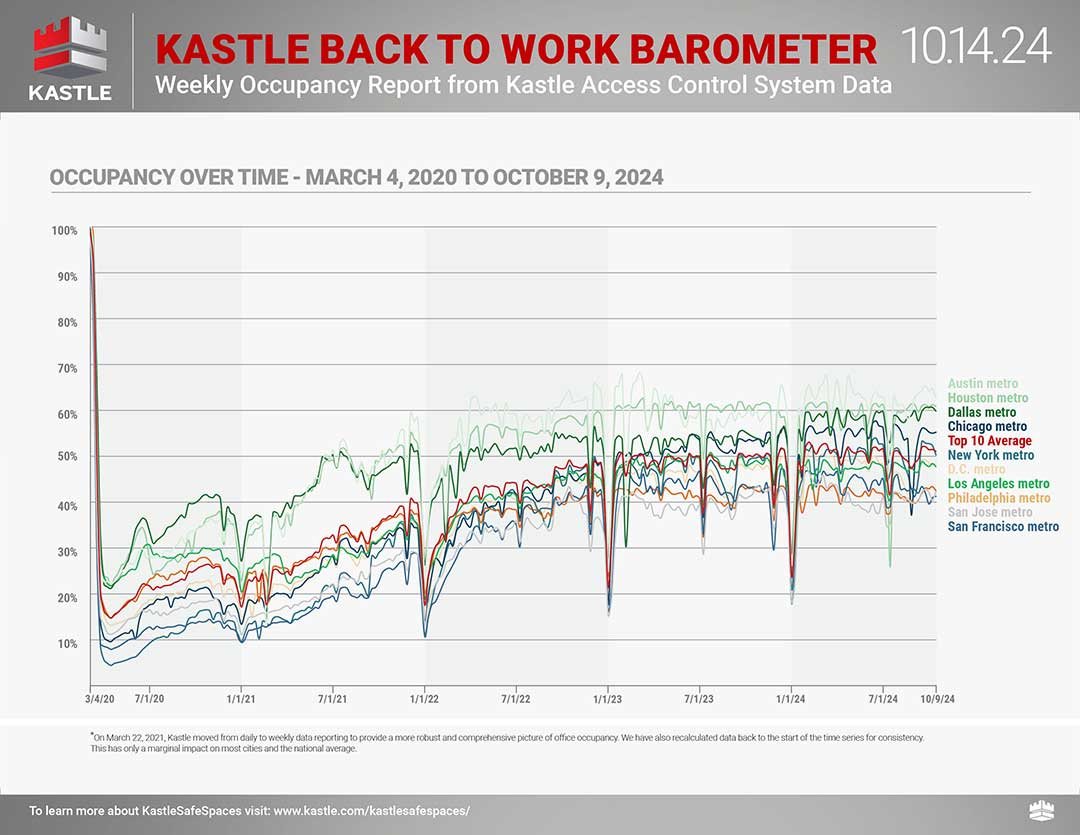
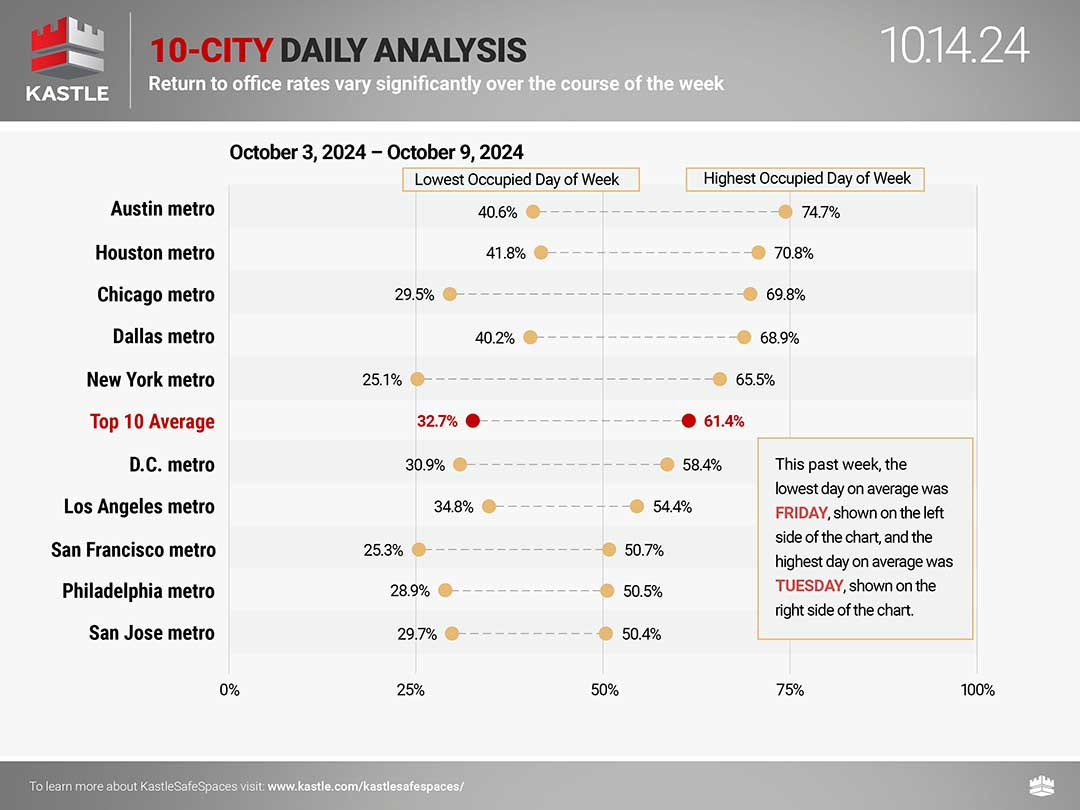
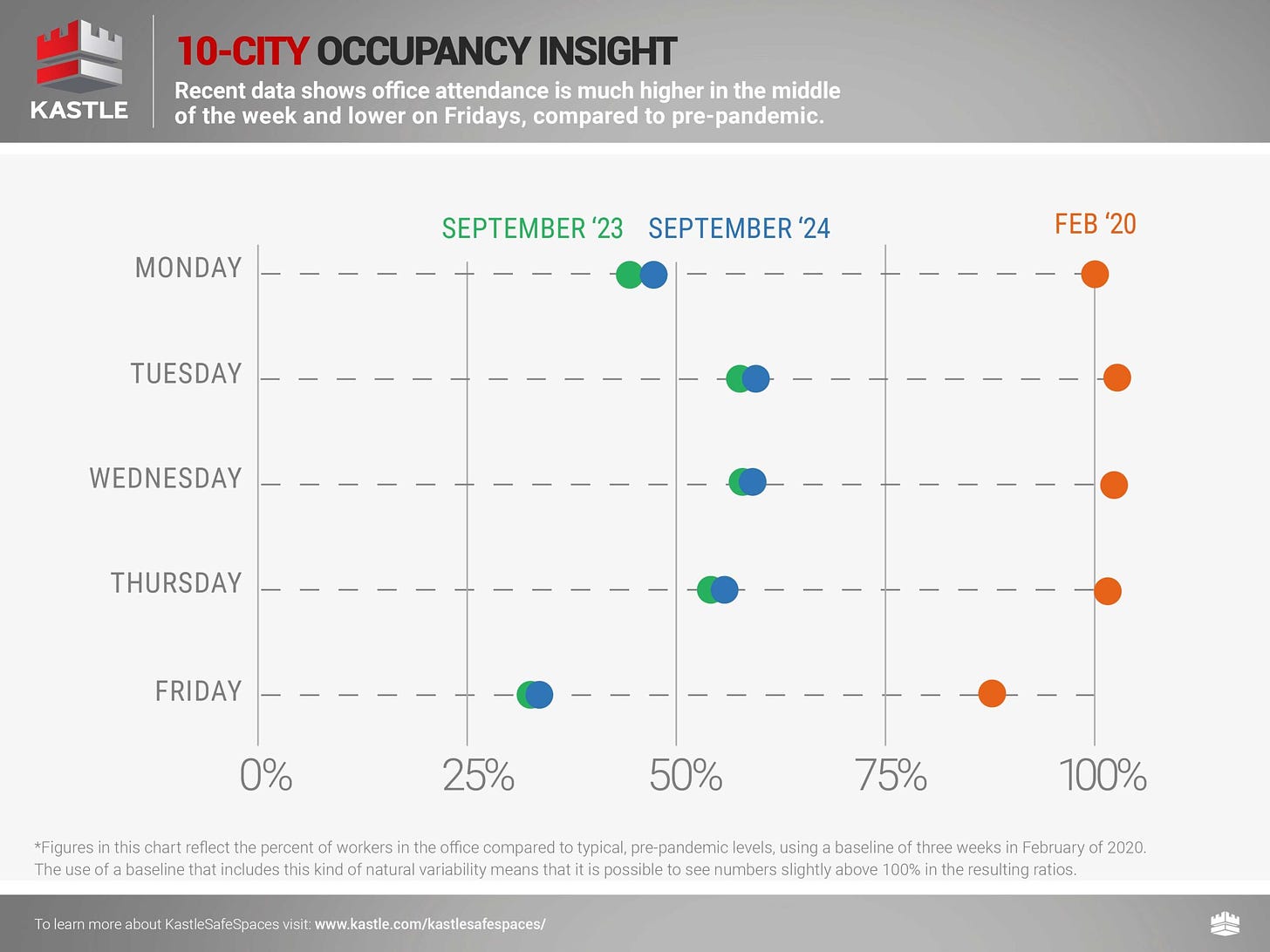
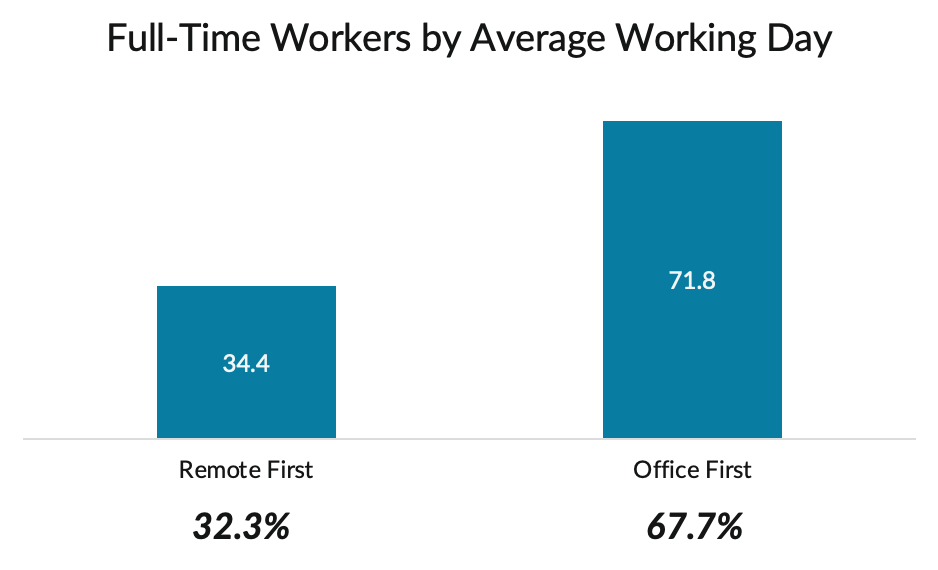
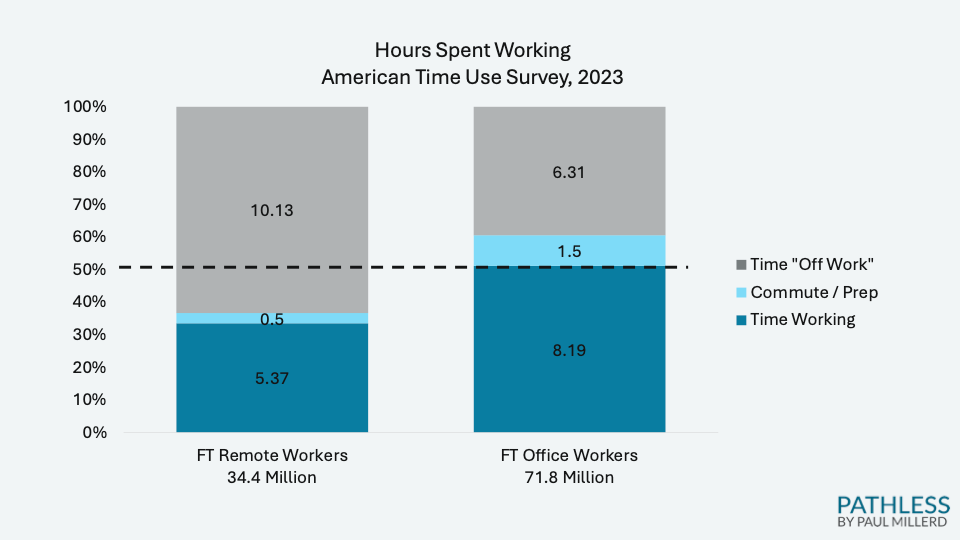

Seeing a lot of extended young adulthood, preferencing larger houses and leveraging dual income remote work
This was a great read! I think one aspect that is often overlooked (especially by companies dictating RTO in a hybrid company culture) is that the ways companies have changed since the pandemic also made in-office jobs less enjoyable.
A lot of companies have teams spanning many locations so they can hire the best people from everywhere. You’re working in a loud, open layout office, don’t have your own desk and in some cases (as I experienced) you’re not even allowed to grab a desk for the day, you’re expected to clear your stuff for every meeting. All of this means: when you do come to the office, you’re spending the day alone, jumping between floating desks and virtual meetings, eating lunch by yourself in a room full of strangers.
Sure, some people love meeting new people all the time but as an introvert, it has made me feel like I’m even less suitable to work a normal job because I need a stable team to feel comfortable.
I loved the energetic feeling I got in university from working intensely on a project with my class mates and for that, I would happily go to an office. But I’ve pretty much never had this happen at my jobs (I started working in the middle of the pandemic) so it feels completely pointless to go to an office.